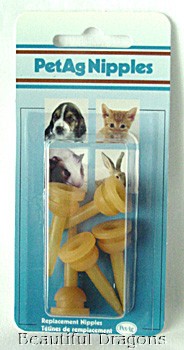|
Beardies
need water just like we do. Proper hydration is very important in the
health of a beardie and is even more important to a sick beardie. When
a beardie becomes ill they are often too weak to drink fluids on their
own, and if they are not drinking or eating they become even more lethargic
and weak. Severe dehydration may lead to shock and even death.
A beardie
that is dehydrated will often perk up after given fluids. If the beardie
does perk up some, you will often have a better chance of curing the
health problem. Of course, if a beardie acts ill, it's often very ill
and should be taken to a reptile vet immediately. Also, most medications
can be damaging to the kidneys and should be given with plenty of water.
Ask your vet to make sure that the fluids will not interfere with the
medicine.
Symptoms
of dehydration are sunken eyes, wrinkled skin, lack of appetite, and
lethargy. A good way of checking to see if your beardie is dehydrated
is to gently pinch the skin on the side of their back between your fingers.
If the skin rolls back into place almost immediately then the beardie
is likely well hydrated. In a dehydrated beardie the skin may stay in
a pinched, or tented position. Depending upon the cause of the beardie's
illness, fluid should be offered by mouth, or by subcutaneous injection.
Ask your vet for details. Remember, dehydration is nothing to mess around
with. It can quickly cause an already ill beardie to become much sicker.
Warning:
Force feeding a severely dehydrated beardie may result in shock and
possibly death. The digestive tract requires fluids to process foods,
if there are not enough fluids available they will be taken from other
critical systems. When dehydrated, having a loss of appetite may be
one way the beardie's body tries to protect itself. However, when the
beardie has been properly rehydrated, it may still fail to eat on its
own. Force feeding may be necessary, but only after rehydrated. The
bottom line is that a beardie must be rehydrated before started on solid
foods.
The best
fluid to give in my opinion is Pedialyte. If you don't have Pedialyte
on hand, don't wait to get some, offer water right away. And bottled
water would be best because of all the added chemicals that they treat
our tap water with. If you have to, sports drinks like Gatoraid will
work, but must be diluted 1:1 with water. Pedialyte is the better choice
as it is metabolized quicker and contains less sugar.
Before forcing
your beardie to drink, try to coax him to drink from a needleless syringe
or eye dropper. I discovered that my beardies will eagerly drink a mixture
of 25% all natural juice with no additives, sugar, or preservatives
(apple, grape, cranberry, etc) with 75% water. See photos below of my
beardies drinking from a syringe...
|
|
|
The photo
on the left is Lizzy eagerly drinking a mix of 25% apple juice with
75% water. He's not my best eater and when he goes off food for a few
days I make sure that he drinks some fluids so he won't get dehydrated
and constipated. Lizzy is a big boy and will usually drink 4 or 5 cc's
at one time.
The photo
on the right is Ojay. When I took this photo he was brumating. It's
not a bad idea to offer your beardies fluids while they are in brumation.
Ojay can drink up to 5cc's on some days. Thirsty beardies!
The benefits
of having a beardie that will drink from a syringe or eye dropper are
endless. I can give meds and probiotics now with ease. I hated to have
to force my beardie's mouth open and shove the meds in. Most meds don't
taste that bad, like Albon. My beardies will lick Albon from a syringe.
|
|
|
 |
|
If you've
tried to get them to drink on their own but were unsuccessful, you may
have to try forcing them to drink, especially if they are on meds that
require the beardie to be kept well hydrated like Albon. Before you
can force fluids into your beardie's mouth, you will need a syringe
(without the needle), or an eyedropper. If you are offering liquids
with a syringe, it should be easy to tell how much you are giving as
syringes have the amount of cc's or ml listed right on them (note: cc's
and ml's are the same). I use a needleless 1 cc syringe with a rubble
nursing nipple. (See photo on the left.)
I simply
cut the very tip of the nipple off so that the beardie can chew on the
nipple without causing any damage to his mouth, teeth, or gums from
the hard plastic needle. The nipples fit perfectly over the tip of the
1cc small syringes. These nipples can usually be found at Petsmart in
the kitten or small animal section. Sometimes the nipples can come off,
and care must be taken to secure the nipple.
Fluids are
generally calculated based on 1 - 2% of bodyweight during a 24 hour
period. Please note that too much fluid at one time may be just as lethal
as severe dehydration because the kidneys and circulatory system can
only handle a certain amount of fluid. A Veterinarian should be involved
to determine the proper amount of fluid, based upon the severity of
the dehydration. See the table below for proper fluid amounts.
|
|